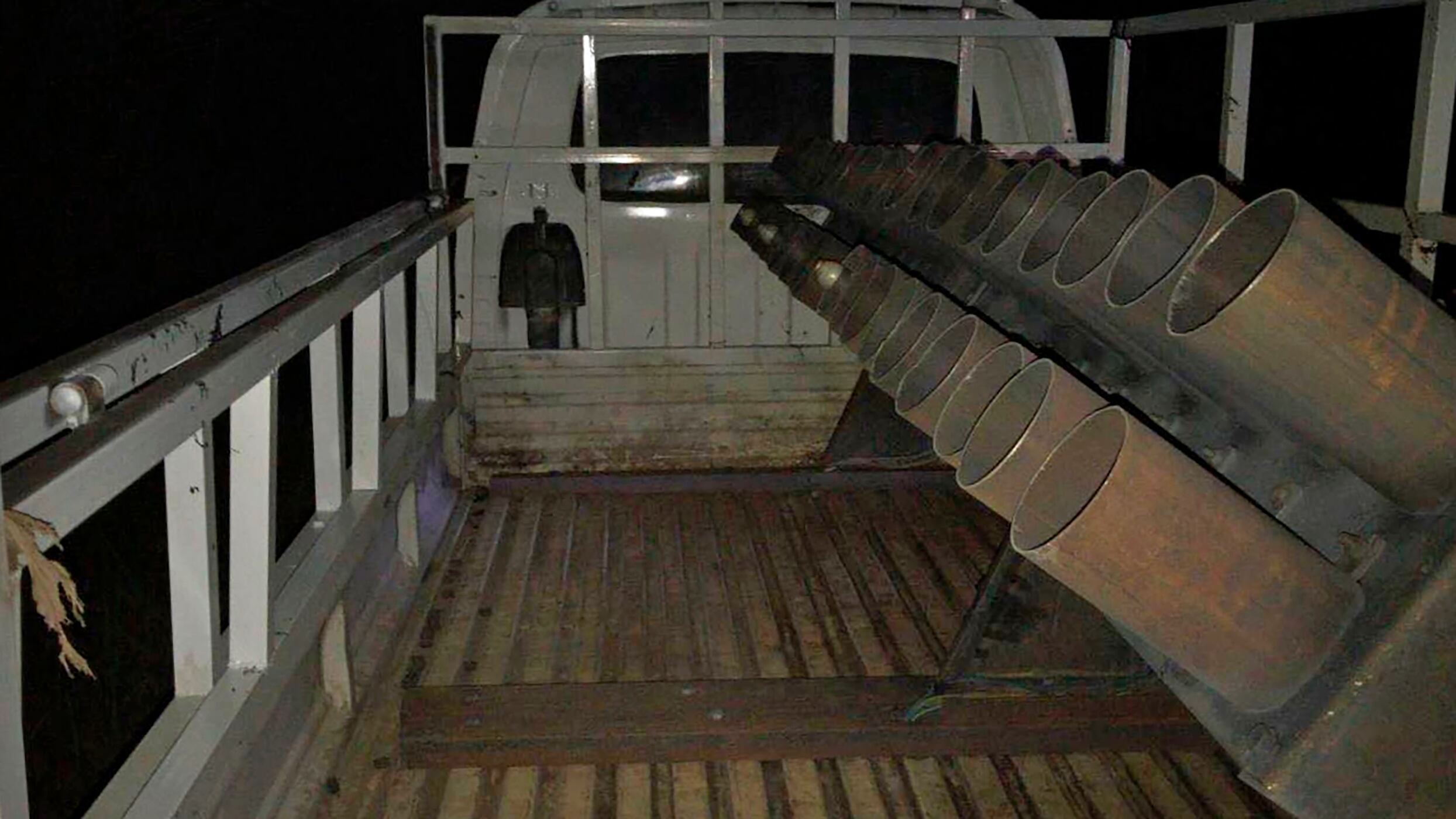Three U.S. troops were injured in a barrage of rockets that hit a base housing U.S. and other coalition troops north of Baghdad on Saturday according to the Pentagon. At least two Iraqis were also injured, Iraqi officials say.
“Last night, there was a Katyusha rocket attack on U.S., coalition and Iraqi forces at Camp Taji," said Pentagon spokesman Jonathan Hoffman in an emailed statement. "We had three U.S. service members who were injured. Two seriously who are being treated at the military hospital at the Baghdad Airport base. "
Hoffman said there were additional injuries to Iraqi partners.
“The Iraqi Security Forces have made an initial arrest and we are investigating the attack with them,” said Hoffman. "These rocket attacks are a deadly and dangerous distraction from the coalition’s mission to help the Iraqis with their goal to permanently defeat ISIS.”
Reiterating Secretary of Defense Mark Esper’s comments last week, Hoffman said: “You cannot attack and wound American service members and get away with it, we will hold them to account.”
The attack comes just days after a similar attack killed three servicemen, including two Americans, that prompted a retaliatory strike against Iran-backed Shia militias.
In addition to the U.S. troops, several Iraqi soldiers were wounded in the attack at Camp Taji, according to Iraq’s official security forces Twitter account. Operation Inherent Resolve spokesman Army Col. Myles Caggins III also confirmed the attack, and added that three coalition troops were wounded.
The officials said over a dozen rockets landed inside the base. Some struck the area where coalition forces are based, while others fell on a runway used by Iraqi forces.
In a series of tweets, Iraq’s security forces described a barrage of nearly three dozen rockets that injured several Iraqi air defense personnel now in critical condition.
“Our forces found seven rocket launchers inside a garage in the area of Abu 'Adham near Al-Taji, north of the capital, Baghdad,” according to the Iraqi security forces.. "When located, it was discovered that 24 rockets did not fire.
This attack caused the injury of a number of members of the Air Defense, who are in a critical condition.
The attack was unusual because it occurred during the day. Previous assaults on military bases housing U.S. troops typically occurred at night.
The earlier rocket attack against Camp Taji on Wednesday also killed a British serviceman. It prompted American airstrikes Friday against what U.S. officials said were mainly weapons facilities belonging to Kataib Hezbollah, the Iran-backed militia group believed to be responsible.
However, Iraq’s military said those airstrikes killed five security force members and a civilian, while wounding five fighters from the Popular Mobilization Forces, an umbrella organization including an array of militias, including some Iran-backed groups.
Saturday morning, Iraqi security officials urged the U.S. to seek their permission before another retaliatory strike.
“We also refuse that the American forces or others take any action without the approval of the Iraqi government and the commander in chief of the armed forces, as they did on the morning of 3/13/2020. In doing so, it does not limit these actions, but rather nurtures them.”
Iran-backed Shiite militia groups vowed to exact revenge for Friday's U.S. strikes, signalling another cycle of tit-for-tat violence between Washington and Tehran that could play out inside Iraq.
America's killing of Iraqi security forces might also give Iran-backed militia groups more reason to stage counterattacks against U.S. troops in Iraq, analysts said.
“We can’t forget that the PMF is a recognized entity within the Iraqi security forces; they aren’t isolated from the security forces and often are co-located on the same bases or use the same facilities,” said Sajad Jiyad, a researcher and former managing director of the Bayan Center, a Baghdad-based think tank.
“Now the (Iran-backed) groups who supported the initial strike in Taji, who were the most outspoken, feel obliged, authorized, maybe even legitimized to respond, ostensibly to protect Iraqi sovereignty but really to keep the pressure up on Americans,” he added.
“There are no red lines anymore," Jiyad said.
Wednesday's attack on Camp Taji was the deadliest to target U.S. troops in Iraq since a late December rocket attack on an Iraqi base, which killed a U.S. contractor. That attack set in motion a series of attacks that brought Iraq to the brink of war.
After the contractor was killed, America launched airstrikes targeting Kataib Hezbollah, which in turn led to protests at the U.S. Embassy in Baghdad.
A U.S. drone strike in Baghdad then killed Iranian Gen. Qassem Soleimani, a top commander responsible for expeditionary operations across the wider Mideast. Iran struck back with a ballistic missile attack on U.S. forces in Iraq, the Islamic Republic’s most direct assault on America since the 1979 seizing of the U.S. Embassy in Tehran.
The U.S. and Iran stepped back from further attacks after the Soleimani incident. A senior U.S. official said in late January, when U.S.-Iran tensions had cooled, that the killing of Americans constituted a red line that could spark more violence.
This story contains information from the Associated Press. Stay with Military Times for updates.
Howard Altman is an award-winning editor and reporter who was previously the military reporter for the Tampa Bay Times and before that the Tampa Tribune, where he covered USCENTCOM, USSOCOM and SOF writ large among many other topics.
Shawn Snow is the senior reporter for Marine Corps Times and a Marine Corps veteran.




